
Córdoba, also called Cordova in English, is a province of southern Spain, in the north-central part of the autonomous community of Andalusia. It is bordered by the provinces of Málaga, Seville, Badajoz, Ciudad Real, Jaén, and Granada. Its area is 13,769 km².

Pedroche is a municipality in the province of Córdoba, Andalusia, Spain. It is located at the centre of Los Pedroches comarca, the northernmost part of Córdoba and Andalusia.

Sebastián de Belalcázar was a Spanish conquistador. De Belalcázar, also written as de Benalcázar, is known as the founder of important early colonial cities in the northwestern part of South America; Quito in 1534 and Cali, Pasto and Popayán in 1537. De Belalcázar led expeditions in present-day Ecuador and Colombia and died of natural causes after being sentenced to death in Cartagena, at the Caribbean coast in 1551.
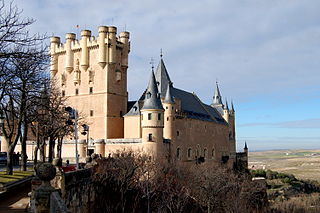
An alcázar is a type of Moorish castle or palace in Spain and Portugal built during Muslim rule, although some were founded by Christians and others were built on earlier Roman or Visigothic fortifications. Most of the alcázars were built between the 8th and 15th centuries. Many cities in Spain have an alcázar. The term is sometimes used as a synonym for "castillo" or castle; palaces or forts built by Christian rulers were also often called alcázars.

Cabra is a rural town in Córdoba province, Andalusia, Spain and the site of former bishopric Egabro. It lies along the route between Cordoba and Málaga in the south of Spain. It is an entrance point to the Parque Natural de las Sierras Subbeticas. Although the main activity in Cabra is primary industry, it is noted as a source of red polished limestone. As a settlement, Cabra has existed over centuries, under many different rulers. In 2005, the municipality had a population of 20,940, most of whom (19,523) lived in Cabra township.
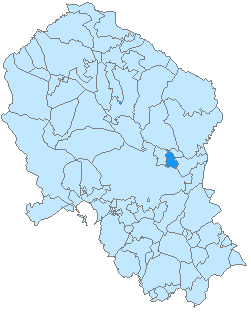
El Carpio is a city located in the province of Córdoba, Spain. According to the 2006 census (INE), the city has a population of 4,477 inhabitants.

El Viso is a village located in the province of Córdoba, Spain. According to the 2006 census (INE), the village has a population of 2,849 inhabitants. It is next to Belalcázar, Hinojosa del Duque, Villaralto, Dos Torres and Santa Eufemia and also next to Ciudad Real, Badajoz and Cabeza del Buey.

The Diocese of Badajoz was a Roman Catholic ecclesiastical territory in Spain, created in 1255. In 1994 it became the Archdiocese of Mérida-Badajoz.

San Salvador el Verde (municipality) is a town and municipality in Puebla in south-eastern Mexico. It is best known as the site of the Chautla Hacienda, which was the property of Eulogio Gillow, the first archbishop of Antequera and contains an English style residence called locally called "El Castillo". The facility today is run as a recreation center.
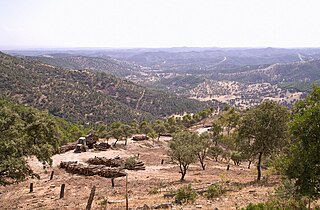
Los Pedroches is a natural region and comarca in Córdoba Province, Andalusia, southern Spain. It is located in the Sierra Morena area at the northern end of the province. The main town is Pozoblanco.
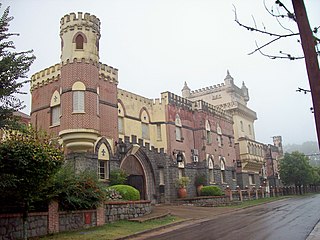
El Castillo Hotel is a building with medieval-style architecture that was built in 1870 and is located in Valle Hermoso (Córdoba), Argentina. Throughout its life under the management of different owners, it has been, in chronological order, a family mansion, a time period hotel, a union summer camp, and a five-star hotel.
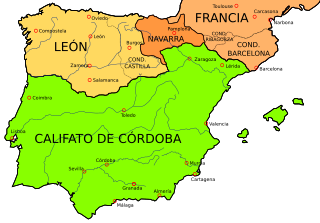
The Battle of Aqbat al-Bakr was a battle of the Fitna of al-Andalus that took place in the area in and around Espiel, Spain. The battle took place between the forces of the Caliphate of Cordoba, whose forces were commanded by Sulayman ibn al-Hakam, and the Muslim rebel forces of the Catalan-Andalusian alliance trying to overthrow their Caliph overlords under the command of Muhammad ibn Hisham, al-Tagr Al-Awsat and several Christian warlords including Ermengol I, Hugh I, and Ramon Borrell.

The Battle of the Morcuera, was a battle of the Spanish Reconquista that took place in the Hoz de la Morcuera between the municipalities of Foncea and Bugedo nearby the city of Miranda de Ebro on 9 August, 865. The battle was fought between the combined Christian troops of the Kingdom of Castile and the Kingdom of Asturias under Rodrigo of Castile and the Muslim forces of the Emirate of Cordoba under Muhammad I of Córdoba. The battle resulted in a victory for the Cordobans and a general retreat in the overall Reconquista process.

Castillo de Belmez is a small fortress located in Bélmez, northwest of Córdoba, in the Province of Córdoba, Spain. It is visible from any angle, as it sits on top of a high limestone rocky outcrop. The neighboring municipalities of Peñarroya-Pueblonuevo, Espiel and Fuente Obejuna are viewable from the castle.

Castillo de Iznájar is a castle located in Iznájar, Province of Córdoba in Andalucia, southern Spain. The castle is perched on the high ridge. It has a triangular design, truncated on the northeast side, with its longest side facing south, and a large central space. It is surrounded by a stretch of wall with flanking towers at the southeast and southwest corners. The east side is closed by a rectangular building, which is attached to the west with a pentagonal tower at the bow, and another tower in the east. Early access to the castle is believed to have been from the east side through a building attached to the primitive rectangular tower. It was declared a Bien de Interés Cultural monument on June 22, 1993.
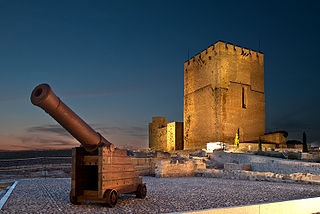
Castillo de Alcalá la Real is a castle in Alcala la Real, in the province of Jaén, Spain. It is a defensive enclosure, located at an elevation of 1,029 metres (3,376 ft). It dates to the 13th-14th century, although some elements of the structure are older. The castle was declared a Bien de Interés Cultural monument in 1993.




















